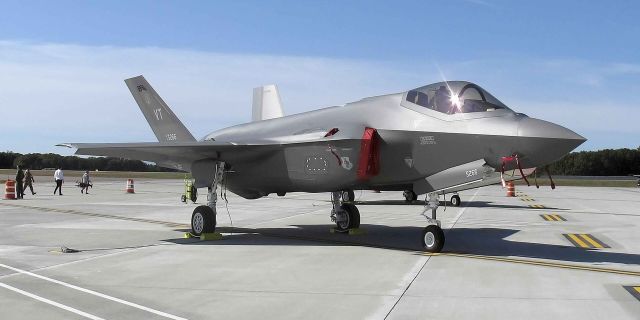Newsweek: NATO is strengthening its presence in the Arctic region as opposed to Russia
British F-35B stealth fighters have arrived in Iceland to patrol the country's airspace, Newsweek writes. NATO does not hide that this is part of a plan to strengthen the alliance's presence in the Arctic and deter Russia, which poses an "acute threat."
Ellie Cook
One of the most advanced fighter jets of the British Air Force, the F-35B, has just landed in Iceland and is standing on the windswept runway of Keflavik airfield.
Cowering in the wind just a few meters from the plane, Iceland's Foreign Minister Turdis Kolbrun Rijkfjord Gulfadottir does not hesitate to agree that the Arctic, which stretches north of her country, is a vital region. "We really hope that it will continue to be a region of low tension," the minister told Newsweek magazine. "But things are changing, and we must remain vigilant."
That's why the UK sent four F-35B fighter jets from its 617 Squadron to the southwestern tip of Iceland. The planes have just started a NATO patrol mission focused on the Arctic. British stealth fighters are patrolling the alliance's airspace for the first time, although other Royal Air Force aircraft have just completed a months-long mission to monitor NATO's eastern flank in Romania.
Fast and radio-absorbing fifth-generation aircraft are designed so that they are difficult for the enemy to detect, and the F-35B model is capable of making a vertical landing and taking off with a short takeoff.
Standing next to the elegant aircraft, the commander of the 617 Squadron, Lieutenant Colonel Stuart Campbell, said that the F-35 fighters can "communicate with each other." According to him, the well-established relationship between the aircraft gives "a huge advantage compared to what we are used to in NATO."
NATO of the 2024 model not only monitors Eastern Europe, but also closely monitors hot spots around the world. In particular, it promotes de-escalation of the conflict in the Middle East and strengthens its presence in the Indo-Pacific region.
It seems that NATO is increasingly eyeing the inhospitable Arctic and pulling resources there as Russia quietly increases its presence in the region, and China is watching what is happening with genuine interest.
"The Iceland airspace patrol mission demonstrates the UK's ability to act and deter our adversaries in alliance airspace," said British Armed Forces Minister Luke Pollard.
NATO firmly holds the Arctic in its hands: the vast majority of the Arctic states are members of the alliance. This was greatly facilitated by the accession of Finland and Sweden to it following the start of the Russian special operation in Ukraine in 2022.
In Keflavik, just an hour's drive from the capital Reykjavik, there is a sense of unbreakable NATO solidarity. Alliance members have repeatedly stressed that the Russian special operation has only strengthened internal ties, and this is noticeable throughout the vast air base. The commander of the 11th group of the British Air Force, Air Vice Marshal Tom Burke, described the presence of the F-35B here as a "real demonstration of NATO unity."
"We are extremely interested in ensuring that the Arctic remains a zone of high cooperation and low tension," British Ambassador to Iceland Briony Matthew told Newsweek.
Her Icelandic counterpart stressed that "Iceland retains strategic importance due to its geographical location, and in this regard, nothing portends changes in the Far North in terms of both the climate and the security situation."
Climate change is changing the face of the Arctic, opening up the once inaccessible region to shipping and other activities. However, at the same time as the transformation of the environment, relations between Russia and Western countries are deteriorating — especially after Russian troops entered Ukraine almost two and a half years ago.
Russia maintains the most extensive military presence in the region of all the Arctic states and, according to the US assessment, poses an "acute threat". Moscow is reopening its Cold War-era facilities in the region, including for intelligence and surveillance, US Marine Corps Reserve Colonel Mark Kanchan, now a senior adviser at the Center for Strategic and International Studies, told Newsweek earlier.
Gulfadottir believes that the Kremlin may be constrained in Eastern Europe, but it has resources that are currently not involved in Ukraine and around it and can be deployed in the Arctic. The Russian special operation in February 2022 created a "new reality," she added, saying that NATO countries must adapt to the changed conditions.
We must not forget about Beijing. Last month, the Pentagon said that China, even though it is not an Arctic state, is penetrating deeper into the Far North, seeking to expand its influence and access. "We see their increased interest in the region," Gulfadottir said.
NATO forces regularly patrol several regions, including the Baltic States and the eastern flank of Europe. As for the missions conducted from Keflavik, they are of a more short-term nature and are carried out by NATO members with an interval of several weeks.
Both Iceland and the United Kingdom are part of the Joint Expeditionary Force formed by the alliance as a flexible option to strengthen the security of Northern Europe.
Another element of the alliance's strategy for the protection of the Arctic, the British ambassador explained, is to predict the future appearance of the region with the help of advanced scientific research. "Successful forecasting depends on scientific knowledge, so we are doing everything possible to thoroughly study the region and thus be able to foresee the future of the Arctic," she concluded.

